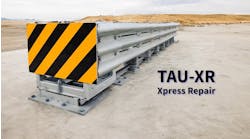By Harlee Hewitt, Associate Editor
Construction workers are often expected to work long, grueling hours in the most extreme weather conditions, yet they are not properly fueled to do it.
A recent survey titled “How Food Fuels Construction Teams,” conducted by ezCater, a provider of corporate food solutions, finds that how construction professionals eat on the job has a direct impact on their performance and job satisfaction.
Among the construction workers surveyed, 87% say they feel hungry during their workday.
“Construction workers made it clear: when their stomachs are full, their output soars,” said Diane Swint, chief revenue officer at ezCater. “These folks are working hungry because they struggle to find affordable and accessible options near the job site. By feeding their workforce, employers can not only help improve productivity, but also boost employee morale,”
The survey, disseminated across 500 construction workers across the U.S, found that 78% of respondents begin work before 8 a.m., with 55% working more than eight hours.
Running on empty calories in the morning appears to be common, with 57% of workers reportedly not being able to make time for breakfast, only caffeine, before long workdays.
As a result, lunch becomes a fundamental part of workers’ productivity and ability to meet quality standards throughout the day.
However, 35% of respondents report not having time to get lunch, and 37% report say it’s too expensive to buy lunch on the job site. There also appears to be limited access on some jobs, as 29% reported not having many food options to choose from.
Workers are also opting for less healthy options perhaps due to limited access, with 90% reporting that the food they eat on the job is “not very healthy.” For 44% of respondents, this means frequenting a gas station or convenience store for food.
The consequences for construction workers not being properly fueled can be more severe than in other industries. According to ezCater’s report, 51% of workers are concerned about making mistakes due to hunger. Worries of rushing a job were reported by 54% of respondents, with 31% percent expressing concerns about skipping imperative safety measures.
According to Swint, one solution is for companies to offer food on the job site.
“We see onsite catered meals as a big opportunity for employers to help improve workers’ productivity and retention, while also boosting morale and happiness at the job site,” she said. “For employers, catering food at the job site is simply good business. Food is a low-cost, high-ROI perk that helps increase employee productivity and job satisfaction. Our report found that onsite catered meals are a valuable way to attract new workers and retain current ones: 61% of constructions workers said they’d be more willing to accept a job offer from a company that gives free lunch and 75% agreed they’d continue working for a company that provides free meals.”
There are several considerations for employers to take to provide food onsite. Ordering the right portions can be a challenge when it comes to headcounts and fluctuating onsite work schedules.
Swint offers one possible actionable step for employers to take.
“Letting construction workers order their own meals, either subsidized or paid for by the company, takes the guesswork out of how much to order. Plus, it lets employees have a wider variety of cuisine options,” she said.
Menu planning and ensuring that everyone has food, including those with allergies, religious or cultural dietary restrictions, must also be a consideration.
“An inclusive food for work program is attainable if you follow best practices,” said Swint. “One option is to survey your workforce to compile a list of their dietary restrictions and using a solution that can match you with local restaurants that provide individually packaged meals or other options to accommodate your employees’ needs.”
While the process of organizing free food onsite might sound complex and resource consuming for employers, Swint says the process can be simple.
“Implementing this type of program is easier than you might think. For example, a third-party platform invites workers to order their own lunch from several restaurants. All the individually packaged meals are then delivered to the workplace at the set delivery time. This means less food and budget waste, and a group of satisfied, well-fed employees.” RB



